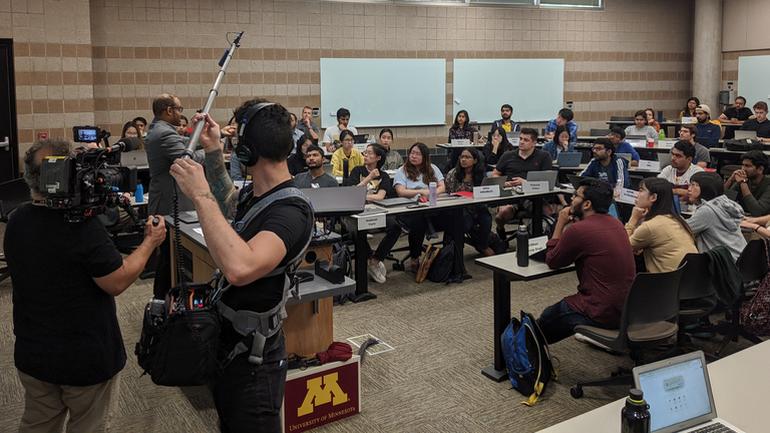
New TPT Documentary Highlights Minnesota Business Community
Friday, November 22, 2019
Almost no other place in the United States can claim more Fortune 500 companies per capita than the Twin Cities. That fact might leave one wondering: How did we manage to attract or grow so many large, successful businesses in the first place?
That question is examined in “Business Lives Here,” a new documentary from Twin Cities PBS (TPT) in partnership with the Carlson School of Management. “Business Lives Here” focuses on the research of Myles Shaver, a professor and the Curtis L. Carlson Chair in Corporate Strategy, and his book, “Headquarters Economy.” Professor Shaver finds that like Silicon Valley is to tech, New York is to finance, and Los Angeles is to entertainment, the Minneapolis-St. Paul region has a specialized cluster of its own: workers who understand management.
An MBA graduate might start working at a place like 3M or Target at first, “and they often take their experiences as they move jobs across town, but to a different company in a different industry,” Shaver says in the documentary. “And really one of the unique things here is that as managers move, they bring these specialized skills that are often developed in one industry to another, we have a cross pollination of management practices in the region. That doesn’t happen in a lot of places, and that’s to the benefit of all companies in this region.”
The documentary highlights two key reasons why talent stays in Minnesota. The first is the ease of dual-income households to find work in their respective fields. That effectively locks people into this region, because moving elsewhere is much harder when both partners are looking for jobs.
The second is the quality of Minnesota’s K-12 education system. Unlike many regions, top executives in the Twin Cities often send their kids to public schools.
“That really creates a disincentive to move, especially if they have to move to a region where they have to start sending their children to private school and the cost that bears,” Shaver says.
Shaver adds that after discussing this fact with a former state lawmaker, he was asked, “You’re telling me that investment in K-12 is just as much about today’s workforce as it is about the workforce in 20 years?” And, indeed, that is what his research shows.
“It’s not the building, it’s not the desks, it’s not the computers, it’s actually the people who work there.”
Of course, knowledge-based fields require higher education, and “Business Lives Here” calls out the fact that no educational institution has as big of an impact on the Twin Cities headquarters economy as the University of Minnesota.
As part of the university, the Carlson School’s mission of “business as a force for good” starts by shaping today’s young minds into tomorrow’s leaders and managers. That means providing a top-notch education that includes experiential learning opportunities, immersion in other cultures through international experiences, and rigorous curricula that doesn’t forget that a successful business isn’t just about the bottom line.
“What we really try to do is help students understand how to run businesses that succeed and that are human for employees and that can continue to contribute strategically,” says Connie Wanberg, professor and Industrial Relations Faculty Excellence Chair at the Carlson School.
The passion of the Carlson School faculty shines through in “Business Lives Here,” says Luke Heikkila, a producer at TPT who worked on the project. “It’s obvious that professors at the Carlson School aren’t just invested in their own research -- they love to teach and engage with students.”
Ensuring that students leave the University of Minnesota prepared is key to the state’s retaining (and attracting) headquarters. Because at the end of the day, that success comes from a deep bench of human capital.
“What distinguishes headquarters is you have this pool of … managerial and administrative talent,” says Shaver. “It’s not the building, it’s not the desks, it’s not the computers, it’s actually the people who work there.”
“Business Lives Here” premiered on Sunday, November 17. It will be shown again on November 24 (1am, 7am, 1pm), December 15 (8pm), and December 22 (2am, 8am, 2pm). It can be watched any time on Twin Cities PBS’s website.
